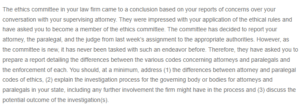Understanding and Applying Paralegal Codes of Conduct- A Guide for Ethics Committee Members
TO: ETHICS COMMITTEE
From: Your Name
DATE: 11/05/2021
RE: ATTORNEY AND PARALEGAL ETHICAL CODES & ENFORCEMENT
______________________________________________________
FACTS
There have been concerns relating to the violation of professional codes of conduct in the law firm. I have demonstrated an ability to apply ethical rules, which is why I have been asked to become a member of the ethics committee. The committee has decided to report the attorney, the paralegal, and the judge who violated professional codes of conduct. My responsibility is to prepare a report detailing the differences between the different codes concerning paralegals and attorneys and the enforcement of each.
ISSUE(S) PRESENTED
The differences between attorney and paralegal codes of ethics.
The investigation process for the governing body or bodies for attorneys and paralegals in Texas, including any further involvement the firm might have in the process.
The potential outcome of the investigation
BRIEF ANSWER
One of the differences between the professional conduct of paralegals and attorneys relates to the unauthorized practice of law. Attorneys violate the unauthorized practice of law when they practice law outside their jurisdiction, while paralegals violate it when they fail to disclose their status as paralegals in the professional environment and practice without the supervision of an attorney (Bluestein v. State Bar; Sussman v. Grado). The second difference is in confidentiality. According to the ABA’s MRPC Rule 1.6, an attorney is considered to have breached confidentiality if he or she reveals information relating to their client (Huynh v. City of Worcester). The NALA Code of Ethics Canon 6 states that paralegals are required to obtain competency through training and education. In Texas, the State Bar of Texas regulates the professional conduct of attorneys. The investigation process begins after an individual is reported by filling out a grievance form on the State Bar of Texas website.
After submitting the form, the board reviews the report and turns it into a formal complaint within 30 days if they find the allegations to be true. An investigation is then conducted by the Chief Disciplinary Counsel to determine whether the attorney or paralegal violated the Disciplinary Rules of Professional Conduct. The grievance is then handled by the Regional Office of Chief Disciplinary Counsel, which has relevant jurisdiction by Rule 2.11 of the Texas Rule of Disciplinary Procedure, either in San Antonio, Houston, Dallas, or Austin. A copy of the complaint is then sent to the attorney accused in the complaint. The attorney is instructed to submit a written response to the Chief Disciplinary Counsel within 30 days so that the CDC can conduct its investigation within the following 60 days. He or she is required to review all documents and information provided by the parties and any additional information gathered. The investigation process of a paralegal includes reporting a complaint to the Paralegal Division Coordinator, State Bar of Texas, or Paralegal Division via email. The firm is only involved in providing facts and documentation during the investigation process. The outcome of the two investigations may be a private or public reprimand, disbarment, or suspension from practice.
ANALYSIS
The Grievance Committee can address a grievance by offering a letter of dismissal, caution, or warning. Dismissal is considered when the committee disagrees with the recommendation from the counsel’s office. A grievance can also be dismissed when the paralegal or attorney is inconsistent with the professional code of conduct, even though there was no violation in the actual complaints. Grievances can also be resolved through censure, reprimanding, or admonition, particularly when the committee believes that the best disciplinary action to take is not disbarment or suspension.
CONCLUSION
Laws and codes regulating the conduct of attorneys are, however, harsher compared to those of paralegals. Paralegals and attorneys have a duty to adhere to professional codes of conduct to prevent the unauthorized practice of law and maintain confidentiality. Attorneys also have a responsibility to ensure that the paralegals under their supervision adhere to the laws of practice and train them to enhance their competence.
References
Huynh v. City of Worcester, 2010 U.S. Dist. LEXIS 84140, 2010 WL 3245430
Sussman v. Grado, 192 Misc. 2d 628, 746 N.Y.S.2d 548, 2002 N.Y. Misc. LEXIS 1044\
ORDER A PLAGIARISM-FREE PAPER HERE
We’ll write everything from scratch
Question
Describe paralegal codes written by attorneys and paralegals.
Instructions/Content:
The ethics committee in your law firm came to a conclusion based on your reports of concerns over your conversation with your supervising attorney. They were impressed with your application of the ethical rules and have asked you to become a member of the ethics committee.

Understanding and Applying Paralegal Codes of Conduct- A Guide for Ethics Committee Members
The committee has decided to report your attorney, the paralegal, and the judge from last week’s assignment to the appropriate authorities. However, as the committee is new, it has never been tasked with such an endeavor before. Therefore, they have asked you to prepare a report detailing the differences between the various codes concerning attorneys and paralegals and the enforcement of each. You should, at a minimum, address (1) the differences between attorney and paralegal codes of ethics, (2) explain the investigation process for the governing body or bodies for attorneys and paralegals in your state, including any further involvement the firm might have in the process and (3) discuss the potential outcome of the investigation(s).
Format:
The assignment should be formatted as a memorandum to the firm’s ethics committee. At least 3 primary legal sources in your memorandum, including case law, as well as citations to the ethical rules for paralegals and attorneys.

